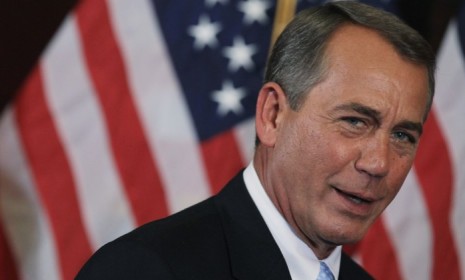Is the Democrats' health-care reform law 'killing' jobs?
That's the GOP's story, and they're sticking to it. Do Republicans have a persuasive case?

A free daily email with the biggest news stories of the day – and the best features from TheWeek.com
You are now subscribed
Your newsletter sign-up was successful
House Republicans are poised to pass their first major legislation of the new Congress, the aggressively named "Repealing The Job-Killing Health Care Law Act." A group of Republican economists and policy wonks stand by the "job killing" claim, but fact-checkers at the AP and McClatchy found little evidence to back up the charge. Do Republicans have a persuasive case that the Democrats' health-care reform law will cost America hundreds of thousands of jobs? (Watch Rep. Chuck Fleischmann argue for the repeal)
The "job killing" charge is "demonstrably ridiculous": The GOP's "farcical" claim that health-care reform will lead to job losses is "transparently false," says Steve Benen in Washington Monthly. Since Obama signed the Affordable Care Act, the health care industry has added more than 200,000 jobs. "If GOP rhetoric were true, these jobs wouldn't have been created." In fact, independent experts say that if anything, "Republicans have it backwards": Repealing the law could kill hundreds of thousands of jobs a year.
"Connecting health care and jobs"
The Week
Escape your echo chamber. Get the facts behind the news, plus analysis from multiple perspectives.

Sign up for The Week's Free Newsletters
From our morning news briefing to a weekly Good News Newsletter, get the best of The Week delivered directly to your inbox.
From our morning news briefing to a weekly Good News Newsletter, get the best of The Week delivered directly to your inbox.
Republicans are just using common sense: The health care law ups the "expected cost of labor" by forcing employers to cover health benefits, says John C. Goodman of the National Center for Policy Analysis in an op-ed piece for USA Today. And "most people intuitively know" that higher labor costs equals less money to spend on employees. Higher-level workers won't like the resulting "wage stagnation," but the law will be "devastating" for the working poor, many of whom will lose their jobs.
"High labor costs = Fewer jobs"
The problem is medical costs, not jobs: The law should have "minimal" impact on the workforce, except to continue "the shift of jobs into medical areas," say the editors of USA Today. That doesn't mean the law can't be improved, though; its real shortcoming is its failure to address the spiraling cost of health care. "Slapping the 'job killing' label on the repeal bill is an effort to avoid making tough decisions" about that.
"Calling it a 'job killer' doesn't make it so"
A free daily email with the biggest news stories of the day – and the best features from TheWeek.com
-
 The ‘ravenous’ demand for Cornish minerals
The ‘ravenous’ demand for Cornish mineralsUnder the Radar Growing need for critical minerals to power tech has intensified ‘appetite’ for lithium, which could be a ‘huge boon’ for local economy
-
 Why are election experts taking Trump’s midterm threats seriously?
Why are election experts taking Trump’s midterm threats seriously?IN THE SPOTLIGHT As the president muses about polling place deployments and a centralized electoral system aimed at one-party control, lawmakers are taking this administration at its word
-
 ‘Restaurateurs have become millionaires’
‘Restaurateurs have become millionaires’Instant Opinion Opinion, comment and editorials of the day
-
 The billionaires’ wealth tax: a catastrophe for California?
The billionaires’ wealth tax: a catastrophe for California?Talking Point Peter Thiel and Larry Page preparing to change state residency
-
 Bari Weiss’ ‘60 Minutes’ scandal is about more than one report
Bari Weiss’ ‘60 Minutes’ scandal is about more than one reportIN THE SPOTLIGHT By blocking an approved segment on a controversial prison holding US deportees in El Salvador, the editor-in-chief of CBS News has become the main story
-
 Has Zohran Mamdani shown the Democrats how to win again?
Has Zohran Mamdani shown the Democrats how to win again?Today’s Big Question New York City mayoral election touted as victory for left-wing populists but moderate centrist wins elsewhere present more complex path for Democratic Party
-
 Millions turn out for anti-Trump ‘No Kings’ rallies
Millions turn out for anti-Trump ‘No Kings’ ralliesSpeed Read An estimated 7 million people participated, 2 million more than at the first ‘No Kings’ protest in June
-
 Ghislaine Maxwell: angling for a Trump pardon
Ghislaine Maxwell: angling for a Trump pardonTalking Point Convicted sex trafficker's testimony could shed new light on president's links to Jeffrey Epstein
-
 The last words and final moments of 40 presidents
The last words and final moments of 40 presidentsThe Explainer Some are eloquent quotes worthy of the holders of the highest office in the nation, and others... aren't
-
 The JFK files: the truth at last?
The JFK files: the truth at last?In The Spotlight More than 64,000 previously classified documents relating the 1963 assassination of John F. Kennedy have been released by the Trump administration
-
 'Seriously, not literally': how should the world take Donald Trump?
'Seriously, not literally': how should the world take Donald Trump?Today's big question White House rhetoric and reality look likely to become increasingly blurred